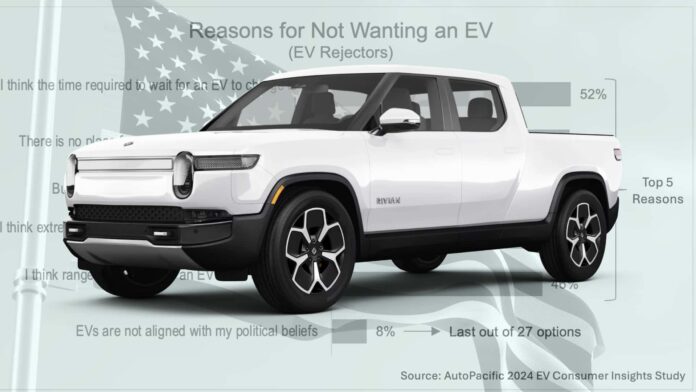Here’s a crazy idea: maybe, just maybe, not everything in America needs to play into our endless culture wars.
For now, at least, electric vehicles are right in those crosshairs. EVs—and the tax incentives provided by the Biden administration’s Inflation Reduction Act that will help them get built and bought in America—have become so clouded by politics in 2024 that elected officials can’t even campaign on the battery factories being built in their districts. As the U.S. explores a more energy-independent future and ways to compete directly with China’s iron grip on battery technology, that kind of knee-jerk partisan pullback feels rather silly.
But politics alone may be less and less of a factor surrounding an EV purchase, according to new data from the industry research firm AutoPacfiic. According to that data, “political identity is still a factor in electric vehicle (EV) ownership, but it may be becoming less of a factor for future EV acceptance.”
AutoPacific surveyed 12,000 Americans—including EV acceptors, rejectors and current owners—and asked why they did, would or wouldn’t consider going electric. Their reasons for or against are the typical ones. They’re worried about the still-higher costs of EVs, the prevalence or lack of charging, environmental concerns, challenges with cold-weather range and overall range.
Another reason is political: EV adoption in America so far has been largely concentrated in wealthier, coastal areas that generally lean Democratic. This, coupled with the unpopularity of EV-related tax incentives and widespread misinformation about what critics say is an “EV mandate” to “force” people to go electric has led to more negative perceptions of these vehicles in more conservative, Republican-leaning areas. Earlier this year, data from Republican political consultant and EV advocate Mike Murphy showed how stark the divide is, and the rhetoric found in the various campaigns across the country has certainly reflected that.
But AutoPacfiic says that as EVs, hybrids and plug-in hybrids grow across many car brands’ lineups and continue to decrease in price, that divide is beginning to narrow. “Findings reveal that 54% of current EV owners and 60% of current PHEV owners identify themselves as Democrat compared to 30% of EV owners and 26% of PHEV owners identifying as Republican,” the study said.
AutoPacific’s Director of Marketing and Consumers Insights Deborah Grieb added: “Our analyses of EV owners over the years have clearly shown a correlation between more left-leaning political views and EV early adopters. But as EVs continue to expand across brands, vehicle types and price ranges, that association is showing signs of fading.” In fact, the 46% of respondents who said they intended purchase an EV or will consider purchasing one in the future were all fairly evenly split among Republicans, Democrats and Independents.


“When it comes to EV rejection, politics do play a small role, albeit a declining one,” Grieb said. “But rejection of EVs is much more likely to be due to charging and cost concerns.”
And that’s much more fair, isn’t it? Because unlike political perceptions that often aren’t based in fact—including politicians who rail against EVs even as massive projects spring up in their districts to bring tens of thousands of new jobs—problems like charging and costs are real and also fixable. The U.S. is adding as many as 1,000 new EV chargers every week and new and used prices are going down as well. Moreover, it’s hard to look at relatively normal and normal-looking electric vehicles like the Chevy Equinox EV and Ford F-150 Lightning and argue that driving one is some kind of “virtue-signaling.” In reality, this is just another powertrain choice, and one that can often save people a ton of money on things like gas and maintenance over time. Simply put, it does not need to be as political as it is right now.

20
That’s just hard to see from the hyper-charged environment we find ourselves in right before Election Day. As Politico’s E&E News reported recently, politicians on the Democratic side have been advised to stay far, far away from anything EV-related; indeed, you won’t be seeing Kamala Harris out there touting electric investments the way Joe Biden once did. “Voters really, really hate electric cars, so stop talking about them,” said David Schor, a progressive pollster with Blue Rose Research, at an event earlier this summer. Meanwhile, these cars have become a cudgel in multiple battleground states, but especially Michigan. Anti-EV ad spending is through the roof and the entire auto industry is in “wait and see” mode to find out what those subsidies and tax incentives will look like from 2025 onward.
But that’s right now, and any industry-wide transformation is a marathon, not a sprint. Maybe AutoPacific’s data indicates people are coming around, no matter who they want to vote for.
Contact the author: [email protected]

